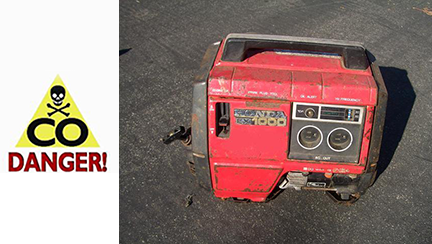It's a New Day in Public Health.
The Florida Department of Health works to protect, promote, and improve the health of all people in Florida through integrated state, county, and community efforts.
Carbon Monoxide (CO)
Carbon Monoxide
Additional Information
For additional information or to provide feedback, contact the Florida Department of Health's Radon and Indoor Air Program at 1-800-543-8279 or phtoxicology@flhealth.gov.
Email: Under Florida law, e-mail addresses are public records. If you do not want your e-mail address released in response to a public records request, do not send electronic mail to this entity. Instead, contact this office by phone or in writing (F.S. 668.6076).

Carbon monoxide (CO) is an odorless, colorless, poisonous gas that can cause sudden illness and death if present in sufficient concentration in the ambient air.
Sources: CO is produced as a result of incomplete burning of fuels like coal, wood, charcoal, natural gas, propane, gasoline, diesel, kerosene, and heating oil. It can be produced by portable generators, small gasoline engines, charcoal grills, gas stoves, portable fuel-powered space heaters, automobile exhaust from attached garages, and smoking tobacco.
Health Effects: The clinical presentation of acute CO poisoning varies depending on the duration and magnitude of exposure. The most common signs and symptoms include headache, nausea, lethargy (or fatigue), weakness, abdominal discomfort/pain, confusion, and dizziness. Other signs and symptoms may include visual disturbances including blurred vision, numbness and tingling, ataxia, irritability, agitation, chest pain, dyspnea (shortness of breath), palpitations, seizures, and loss of consciousness.
Laboratory Tests: Blood carboxyhemogolbin (COHb) level is useful in confirming the diagnosis of carbon monoxide poisoning. Environmental monitoring data collected by first responders is also useful in the detection of CO exposure.
- CO Poisoning Prevention Methods
- Surveillance and Investigation
- Additional Resources
Install a CO alarm in your home if you have combustion appliances or an attached garage.
Be sure all appliances are properly installed and used according to the manufacturer's instructions.
Have fireplace, combustion heating, and ventilation systems, including chimneys, flues, and vents, professionally inspected every year.
Do not burn charcoal inside a house, garage, vehicle, tent or fireplace.
Always use generators outside, more than 20 feet away from home, doors, and windows.
Do not use unvented combustion heaters in enclosed spaces, especially sleeping areas.
Never leave an automobile running in a closed garage or in a garage attached to the house - even with the garage door open.
While driving, keep the rear window or tailgate of a vehicle closed, as CO from the exhaust can be pulled inside.
If you suspect you are experiencing any symptoms of CO poisoning, open doors and windows, turn off gas appliances and go outside.
In cases of severe CO poisoning, call 911 emergency services or call the Florida Poison Information Center at 1-800-222-1222.
Additional Prevention Resources
Carbon Monoxide Brochures:
CO poisoning is a reportable condition in Florida. Physicians and laboratories are required to contact the local County Health Department or the Florida Department of Health Bureau of Epidemiology at 850-245-4401 to report a suspected case of CO poisoning. Florida Department of Health has standard case definition and surveillance and investigation guidance for CO poisoning.
CO Poisoning data is available at Environmental Public Health Tracking and Florida Morbidity Statistics Report.
Press Releases:
Florida Department of Health Cautions Against Carbon Monoxide Poisoning
CPSC Urges Caution with Heating as Winter Weather Arrives - Carbon Monoxide Deaths on the Rise
Internet Resources:
CDC Health Alert Network (HAN) – Hurricane Harvey — Clinical Guidance for Carbon Monoxide (CO) Poisoning
MMWR article - Monitoring Poison Control Center Data to Detect Health Hazards During Hurricane Season - Florida, 2003-2005
Centers for Disease Control (CDC) and Prevention: Carbon Monoxide presentation given by Dr. Shahad Iqbal at the EPA Region 4, quarterly conference call (PDF, 464 KB)
Centers for Disease Control (CDC) and Prevention: Carbon Monoxide Poisoning
CDC Carbon Monoxide Poisoning: Flyers and Other Educational Materials
CDC - Prevent Carbon Monoxide Poisoning
US Dept of Commerce, National Institute of Standards and Technology (NIST): How Close is Too Close for Portable Generators?
U.S. Environmental Protection Agency - Carbon Monoxide's Impact on Indoor Air Quality
*Note: This page contains materials in the Portable Document Format (PDF). The free Acrobat Reader may be required to view these files.



Connect with DOH